QuestionHi,
My son has 2 male rats, littermates born in July, 2006. Chewy has a history of hair loss that my vet didn't really have an explanation for. A few weeks ago, we noticed a lump on his side, just past his ribs. It felt pretty encapsulated. My vet suggested surgery but at his age, we weren't sure we should put him through it. Now he's started losing weight, though the tumor doesn't seem to have gotten bigger. Should we reconsider surgery or would it be more humane, given his age, to leave it and just try to supplement his diet to get some weight back on him and keep him comfortable?
Thanks for any advice. These guys snuggle their way into your heart!
Sue
AnswerYes they sure steal your heart!
I do want to say that your boys are not super old. I have had surgery done on some of my 3 year old rats. Think of age as a number rather than a disease. If your boy is otherwise healthy, I say go for it. It also depends on the vet of course. I would only trust a vet that had experience and also had the ability to treat him on his level rather than compromise using surgical tools etc...that were meant for a small animal like a cat rather than a small mammal. Unfortunately only a certified avian/exotic vet provides this kind of outstanding care meant for our little rats. There are general traditional vets that have a strong interest in exotics and have taken the time to go to exotic conferences and classes etc...to learn more about the little critters that treat more often and also invest in the small scale implements needed to care for them especially during an emergency.
However, this doesnt necessarily apply to you at all since I do not know anything about your vet, but for other readers that may be reading this as well. I have learned that alot of people read through the questions I am asked before they ask me anything in case they find the answer they are seeking first. I encourage everyone to write no matter what since every case is individual and every rat is different. If I tell you that you should have the surgery, that is ONLY after learning about your rats history and doesnt mean this can apply to someone elses 2 year old rat. If that makes sense.
Anyhow, about the hairloss: often diet will play a big part in skin and hair loss and if your little man has had a diet higher in protein or even a normal amount of protein but he is still sensitive to it, this could create alopecia. Sometimes hormones play a role too. I am assuming mites were ruled out by the vet. Was there blood work done to see if it was hormone related?
Back to tumors. How big is the tumor? Is this tumor oval? Is it more disc shaped, like a flatter circle or round and raised? Can you compare it to a grape or bigger? Has his appetite increased? If he has been eating more than usual and still losing weight, the tumor has already become vascular. The area that it is in should be easy to remove. If it were up higher in the neck area or even the chest, that makes it a bit more involved, esp with major arteries. Sometims they branch out and the tissue will actually entangle into major blood vessels. The vet can still remove it but may have to leave parts of the mass which is not a big deal as long as the tumor is benign. The good news it they are usually encapsulated and if it is a mammary tumor which i strongly suspect due to its location, it should peel right off leaving very little invasion and the cut itself would not even be that deep. This is good for healing since the vet can be creative with sutures, stitching internally leaving nothing on the outside so he wont have to worry about the rat picking the stitches. Comfort is key and narcotics for a few days after surgery and he will not want to pick them. Most vets fear that narcotics will make the rat feel too good and in turn the rat may over do it and rip his incision open but the truth is, the rat feels discomfort and will dig and tear at the surgical site trying to get relief. Narcotics for at least two days and metacam afterwards is the way to go.
I cant tell you what to do but what I have done in the past on my older rats, including my 3 year old rat, is to have post op blood work taken, checking the liver and kidneys and even heart enzymes. If the vet has a CAT scan, that would be perfect to see what this tumor is doing internally. Put it this way, if the vet opens him up and sees a big mess involved, he can opt to NOT remove the mass and stitch him up and just let him live his life out naturally, but I would at least exhaust all options and this includes going for the surgery.
As long as the vet is equipped for this surgery, from having the proper implements for small mammals such as specialized equipment for administering anesthesia and monitoring vital signs of exotic patients. Also, positive pressure mechanical ventilation, constant blood pressure monitoring, cardiac monitors and an anesthesia technician that is trained in exotics are all part of the proper setting when it comes to being able to support a safe experience for the small mammal.
Since rats lose body temp fast, its vital to keep them warm during and after surgery so the vet should be able to provide a heated table and also a thermostatically controlled incubator to be used to house the rat recovering from surgery to keep his body temp warm.
Keeping the rat overnight one night is also important but some clinics dont have this ability. I know of a clinic that has an apartment upstairs and techs would rent the place out and live there, and in exchange for rent, they would tend to patients that were there over night. Not a bad deal for a 1 or 2 bedroom apartment!
Anyhow, let me know about the shape and size of the tumor and his past health history.
I dont want to steer you in the wrong direction so the more I know the better I can honestly say NO! DONT! or yes, go for it in no uncertain terms!

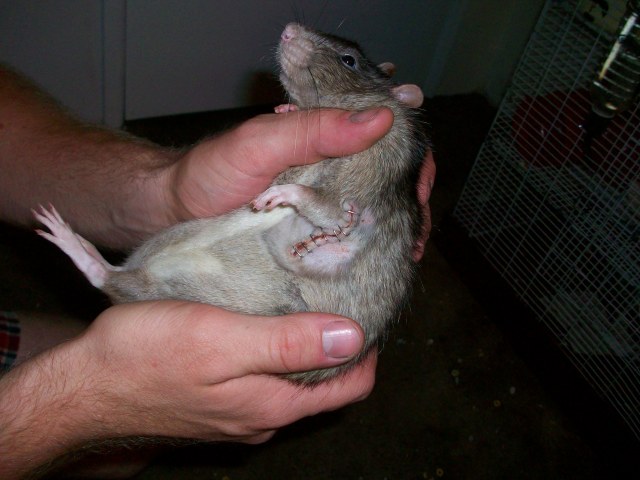 Rat-O being adorable
QuestionIncision closed with s
QUESTION: Hi Sand
Rat-O being adorable
QuestionIncision closed with s
QUESTION: Hi Sand
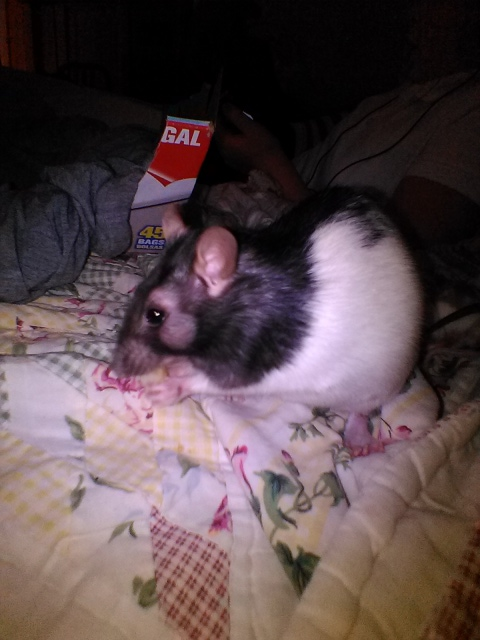 mom rat may have abscess
Question
rat abscess?
our rat had a litter of 1
mom rat may have abscess
Question
rat abscess?
our rat had a litter of 1
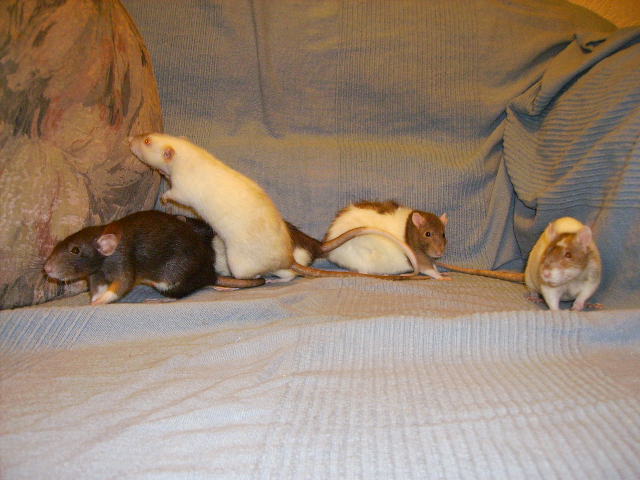 What is a
QuestionQUESTION: I went to a PETCO near me to look at
What is a
QuestionQUESTION: I went to a PETCO near me to look at
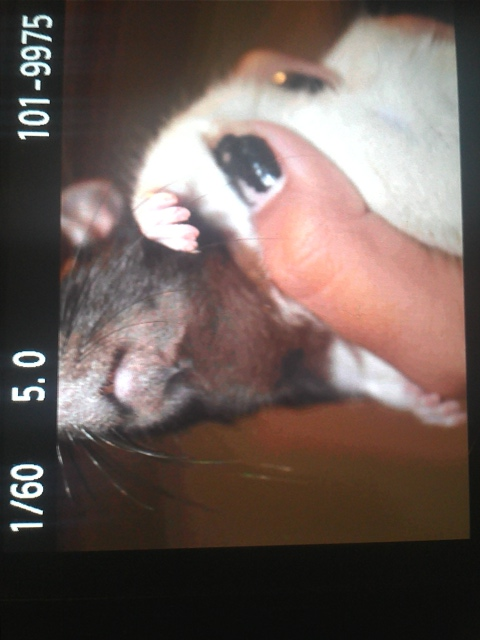 why a rat should see the vet
QuestionQUESTION: Thank you so much for all this inform
why a rat should see the vet
QuestionQUESTION: Thank you so much for all this inform
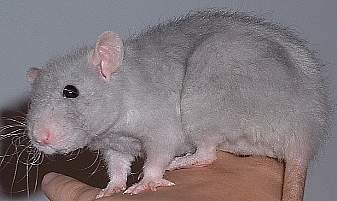 curly whiskers and cleaning
QuestionQUESTION: Our Fancy rat has developed curly whi
curly whiskers and cleaning
QuestionQUESTION: Our Fancy rat has developed curly whi